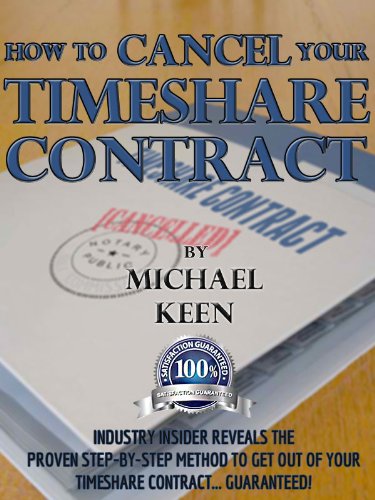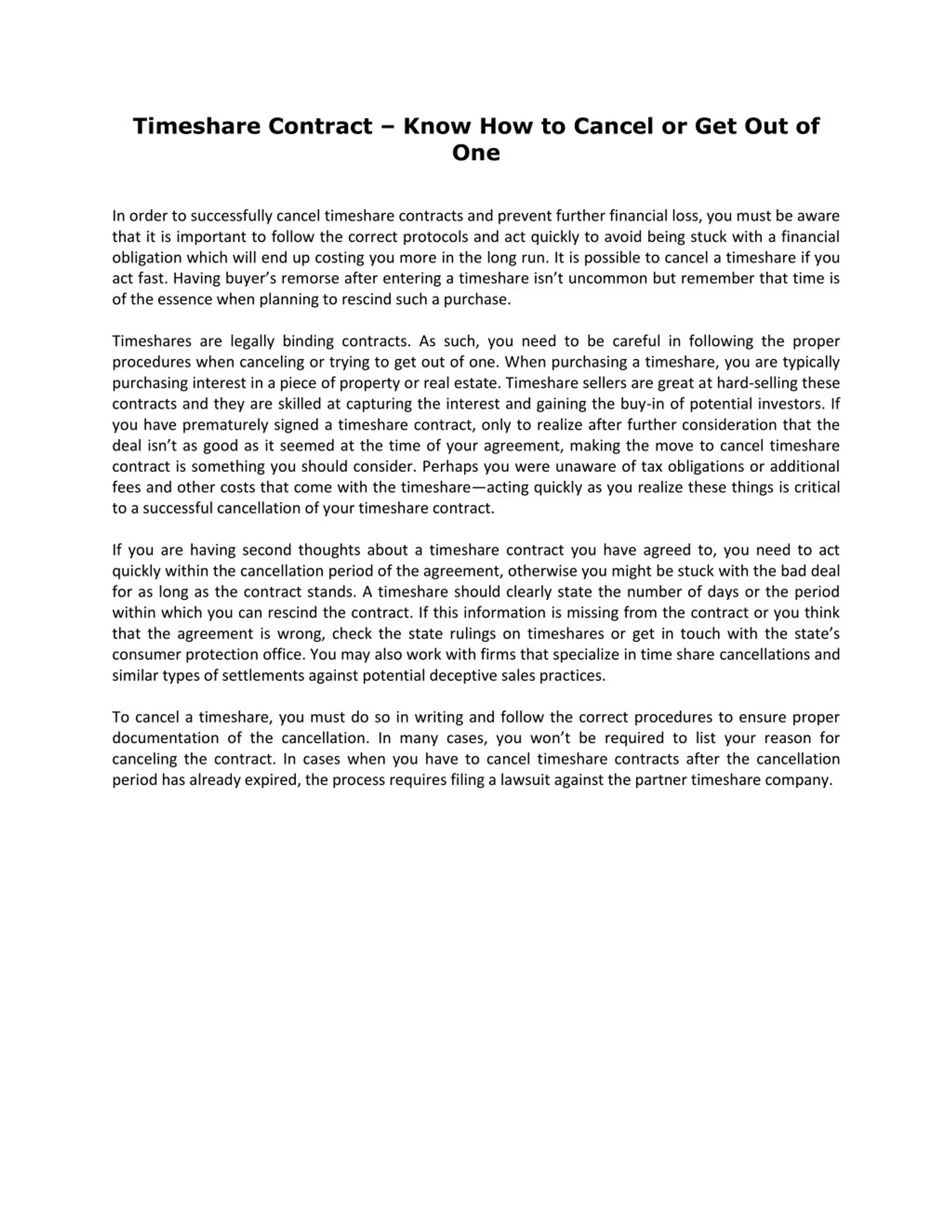Please e-mail your comments to: T_R_Oglodyte@yahoo. com. A timeshare is a program in which a group of individuals shares usage of a residential or commercial property by dividing getting rid of a timeshare legally among themselves the rights to use the home for specific period. Although the residential or commercial property is usually a domestic job such as a condominium, developers have used the timesharing concept to other kinds of residential or commercial properties, such as houseboats, campgrounds, and recreational automobile parks.
To set up the timeshare, the designer "divides" occupancy of each of the systems into time-based intervals. The developer then offers these periods to buyers, so each owner of an interval receives the right to use a specific unit for a specific time period representing the interval they acquired.
Through this shared use, the owners have guaranteed lodgings in the home, without bring the monetary and residential or commercial property management problems related to a standard ownership of such a residential or commercial property. Timeshare periods are normally one week long; a few timeshare tasks, nevertheless, utilize other ownership fractions, such as one-tenth or one-quarter ownerships.
In keeping with this convention, through the rest of this course I typically describe timeshare intervals as "timeshare weeks" or "weeks". In addition to the purchase price, timeshare owners likewise pay a yearly fee for home upkeep and management. A lot of timeshare jobs also reserve a couple of one weeks use of each system for repair and maintenance.
Facts About How Can I Get Out Of My Timeshare Uncovered
The timeshare industry has also had its share of dishonest and dishonest resort developers and operators. As a result, timesharing has a bad reputation with lots of people. Although the timeshare industry has actually improved its sales discussions, customer awareness and education is still necessary for owners to avoid being misguided and to obtain the most worth from their timeshare purchases.
In spite of these perceptions, timesharing is an excellent item for numerous individuals. Timesharing makes resort ownership possible for lots of people who otherwise would not have the ability to take pleasure in such facilities, and there are many satisfied timeshare owners (including the author). After purchasing one system and enjoying it, numerous timeshare owners have actually acquired extra timeshares (timeshare how it works).
Since of the bad impression lots of people have of timesharing, timeshare designers have actually developed other names for timeshare projects, such as "Trip Ownership" or "Fractional Ownership". These programs are still timeshare jobs, and much of the same principles use. While all timeshare programs supply you, as the owner, a right to occupy a facility for a given duration (usually one week every year or every other year), there are lots of differences in how this is done.
In a set week system, your occupancy right is for the exact same week, and typically the very same system, every year. For instance, if your timeshare ownership were for week 34 in System 253, you would have a guaranteed right to inhabit Unit 253 for the 34th week of the year.

Some Of How Do You Get A Timeshare
So, if the check-in day for System 253 is Saturday, then week 34 begins on the 34th Saturday of the year, with check-out on the 35th Saturday of the year.) As can be expected, some weeks are more popular than others; this is generally shown in the purchase rate for the timeshare system.
A drifting right is beneficial if you do not want your use limited to a provided week every year. Given that all other owners that share your float duration can schedule whenever throughout that duration, if you delay making a reservation you might find that all of the units have actually currently been reserved for the times that you want to reserve (how to sell timeshare points).
Resorts set their own policies as to how far in advance their owners can book their floating week uses. This lead-time can be as little as 9 months or as much as 2 years in advance of the check-in date. Numerous resorts will require advance payment of maintenance charges to schedule a float week, particularly if you plan to use the week in a timeshare exchange.
Because the specific week deposited with an exchange business straight affects the exchange value of the deposit, the procedures your resort utilizes to assign drifting weeks for exchanging will affect the types of exchanges you can finish with your timeshare. A couple of timeshare projects utilize a rotating week system. In this type of program, your use week modifications from year to year on a fixed schedule.
3 Easy Facts About How To Sell A Westgate Timeshare Explained
In Year 4, the cycle would begin over again with week 9. Rotating weeks enable all owners a chance to utilize the resort during the most popular durations. Another major distinction is whether the timeshare is a deeded interest or a "right-to-use" plan. Most deeded programs divide ownership of each system into particular week increments, and as a purchaser, you actually buy a fractional ownership of the system.
In some cases, the deed might just convey a specific fractional ownership interest representing the ownership period without connecting the ownership to a particular week, for instance, a concentrated 1/52nd interest in System 253. Because your ownership in a deeded home is ownership of property, you can offer the timeshare unit, provide it away, or bequeath it to beneficiaries, just as with other real property.
At the end of that duration, the use rights revert to the residential or commercial property owner. Usually you can sell, donate, or bestow a "right-to-use" agreement, however the expiration date will remain the exact same. Due to the fact that many countries either prohibit or seriously restrict foreign ownership of property, a right-to-use program may be the only way to effectively establish a timeshare task in those nations.
These files are generally described as the "program files". For a deeded residential or commercial property, the program documents are normally in the kind of Codes, Covenants and Restrictions (CCR) that attach to the ownership of each timeshare interval and are binding on all owners at the property (consisting of subsequent buyers). For a right-to-use residential or commercial property, the right-to-use agreement will either include the program documents or will integrate them by reference.
The Buzz on Look at this website How To Buy A Timeshare Resale
In a deeded floating program, the CCR or program files will https://writeablog.net/arwynee39o/purchasing-a-timeshare-methods-buying-a-period-of-time-at-a-system-or-house-in specify that the owner's use is a floating right that needs to be booked, and that the owner does not get any unique choices to schedule the system and week that appears on their deed. An important difference in between deeded and right-to-use residential or commercial properties includes ownership of the resort.
When the resort is first opened, the designer owns the weeks and, thus, manages the task. As the developer sells timeshare units, the designer's ownership level decreases, and control of the property typically moves to the owners. If the residential or commercial property manager defaults or goes bankrupt, you and your fellow owners will still own the home as shown in your deeds.

The designer typically keeps the right to offer or transfer the property, including the timeshare program, to a 3rd celebration. The designer may also be able to unilaterally change aspects of the timeshare program, increase yearly costs, or impose unique assessments. Owners of right-to-use periods might have little or no ability to prevent or influence such actions by the developer or operator.